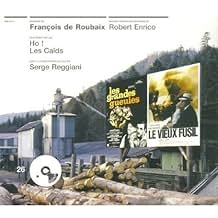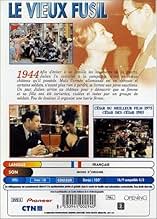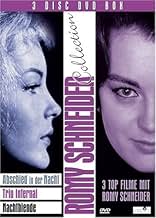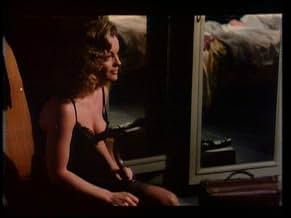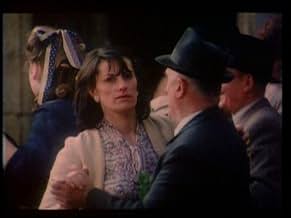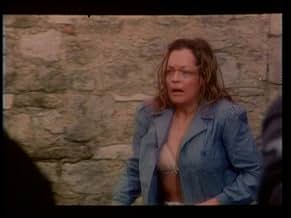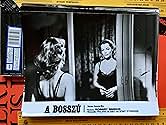IMDb RATING
7.5/10
5.3K
YOUR RATING
During World War II, a peaceful French surgeon decides to ruthlessly exterminate an SS squad because of the atrocities they'd just committed in his countryside home and childhood village.During World War II, a peaceful French surgeon decides to ruthlessly exterminate an SS squad because of the atrocities they'd just committed in his countryside home and childhood village.During World War II, a peaceful French surgeon decides to ruthlessly exterminate an SS squad because of the atrocities they'd just committed in his countryside home and childhood village.
- Awards
- 4 wins & 6 nominations total
Featured reviews
The Allies are closing in on their small town, but not quite quickly enough for the liking of local surgeon "Dandieu" (Philippe Noiret) so he relocates his wife and daughter to their remote castle, well off the beaten track, in the hope that they can sit out the rest of the war safely. When he takes a drive out to see them some time after, he arrives at it's small chapel to be met by a vision of carnage. Racing to the castle, he gets there just in time to see the brutality of the Nazis at their worst and immediately vows revenge. Just how, though, can this civilised old gent possibly inflict any sort of vengeance on this well armed troop? Well, for a start he has an old shotgun that had been carefully hidden amidst the tunnels beneath the building. Then there are these particularly useful tunnels themselves; there's a secret passageway up into the salon and finally, he's an ingenious chap who considers that he now has very little left to lose. Fuelled by some intermittent reminiscences of life with his wife (Romy Schneider) and nimble on his feet, Noiret now proceeds to present us with an almost entertaining rabbit-shoot of a scenario before a denouement that is entirely fitting and yet touching, too. There's not a great deal of dialogue: the imagery does enough of the speaking, and the whole scenario paints quite a potent picture of the dangers faced by many decent people whose lives were terrorised by these brutes during WWII. It also touches, slightly, on the psychological effects of what he witnessed and their aftermath: his sense of purpose serving to divert his realisation of just what had happened long enough to get the job done. Schneider doesn't feature so often, but when she does she not only lights up the production but her character's brief appearances emphasise just how ghastly and inhumane their occupiers really were, and that presence is also well epitomised by Joachim Hansen's SS officer. Some attention has gone into the look of the film and with a Noiret very much on-form, it's well worth a watch.
On June 10th 1944, less than two weeks before the Normandy landings, almost the entire population of the village of Oradour-sur-Glane was slaughtered by members of a Waffen SS division. That atrocity is not reconstructed here but forms the basis of Robert Enrico's film.
Surgeon Julien Dandieu arrives at the village where he grew up, the castle of which he happens to own, only to find a scene of mass carnage in which his beloved wife and daughter have perished. His unbearable grief soon gives way to a natural, all-consuming hatred for the Nazi perpetrators who have taken over the castle. Taking advantage of his intimate knowledge of the castle with all its hidden passages and armed only with a double-barrelled shotgun used for hunting wild boar, he sets about stalking his human prey and exacting retribution. The method by which he disposes of the highest ranking SS officer is singularly appropriate.
Suffice to say this is a grim, harrowing and violent film, at times graphically so but has great tension, momentum and first class editing.
It is in effect an early 'vigilante' movie but is well balanced by being a love story also. The use of flashbacks to show the domestic bliss of Dandieu, his wife Clara and their daughter is dramatically very effective.
As Clara the wondrous Romy Schneider once again touches the heartstrings.
The film proved extremely popular with French audiences who had never seen anything like it before. Despite its merits I am not certain that it deserved to win the César for Best Picture although its emotive subject matter no doubt helped and the competition that year was not that stiff. I also found the jaunty title music of Enrico's preferred composer Francois de Roubaix rather incongruous. Pleased to say that the superlative Philippe Noiret in his second collaboration with this director, was awarded the first of his two Césars and a Donatello for his riveting performance as Dandieu. Also of note are Jean Bouise giving his customary understated performance as a family friend and the excellent Joachim Hansen who has succeeded in making the SS officer more than just a one-dimensional nasty Nazi.
This piece, which established Enrico as a director, mixes the genres of war, action, romance and it must be said, exploitation.
We must not lose track of the horrific historical event that inspired the film which acts as a distressing reminder of the barbaric cruelty to which humans can sink.
Surgeon Julien Dandieu arrives at the village where he grew up, the castle of which he happens to own, only to find a scene of mass carnage in which his beloved wife and daughter have perished. His unbearable grief soon gives way to a natural, all-consuming hatred for the Nazi perpetrators who have taken over the castle. Taking advantage of his intimate knowledge of the castle with all its hidden passages and armed only with a double-barrelled shotgun used for hunting wild boar, he sets about stalking his human prey and exacting retribution. The method by which he disposes of the highest ranking SS officer is singularly appropriate.
Suffice to say this is a grim, harrowing and violent film, at times graphically so but has great tension, momentum and first class editing.
It is in effect an early 'vigilante' movie but is well balanced by being a love story also. The use of flashbacks to show the domestic bliss of Dandieu, his wife Clara and their daughter is dramatically very effective.
As Clara the wondrous Romy Schneider once again touches the heartstrings.
The film proved extremely popular with French audiences who had never seen anything like it before. Despite its merits I am not certain that it deserved to win the César for Best Picture although its emotive subject matter no doubt helped and the competition that year was not that stiff. I also found the jaunty title music of Enrico's preferred composer Francois de Roubaix rather incongruous. Pleased to say that the superlative Philippe Noiret in his second collaboration with this director, was awarded the first of his two Césars and a Donatello for his riveting performance as Dandieu. Also of note are Jean Bouise giving his customary understated performance as a family friend and the excellent Joachim Hansen who has succeeded in making the SS officer more than just a one-dimensional nasty Nazi.
This piece, which established Enrico as a director, mixes the genres of war, action, romance and it must be said, exploitation.
We must not lose track of the horrific historical event that inspired the film which acts as a distressing reminder of the barbaric cruelty to which humans can sink.
After reading other reviews and comments on 'Le Vieux Fusil' I see that this film has been vastly misunderstood. Yes it is about revenge but it is above all a love story. It is about the love of a man for his wife and daughter. I watched the movie as a teenager and have not seen it in years but to this day this is the impression it left on me. It is a beautiful love story between two people, and a man who would do anything to avenge the people he loved more than anything. Some scenes are incredibly violent and we can only imagine the atrocities people have gone through during the war. Atrocities that like in this movie make Philippe Noiret's character flip.
Romy Schneider and Philippe Noiret are both magnificent in their roles.
Romy Schneider and Philippe Noiret are both magnificent in their roles.
10vrapp
> This is where we may wonder why it has taken so much to rouse this peaceful man;
Everybody has his own threshold of awakening; and this film is actually the story of awakening - this is why the whole first part showing his peaceful life, even during the war, up until he is led to his threshold, and so the contrast between that and merciful killer that he becomes, becomes even more powerful.
> The next question we find ourselves asking is why he is content to go up against men armed with pistols, rifles,machine guns, grenades and flame-throwers with only a shotgun rather than picking off one man and appropriating his weaponry.
The best weapon is the weapon you are used to, the weapon you trust. Plus, this old gun together with the old castle and their old owner, become one collective weapon against the invaders. Not wise to take one piece out.
Everybody has his own threshold of awakening; and this film is actually the story of awakening - this is why the whole first part showing his peaceful life, even during the war, up until he is led to his threshold, and so the contrast between that and merciful killer that he becomes, becomes even more powerful.
> The next question we find ourselves asking is why he is content to go up against men armed with pistols, rifles,machine guns, grenades and flame-throwers with only a shotgun rather than picking off one man and appropriating his weaponry.
The best weapon is the weapon you are used to, the weapon you trust. Plus, this old gun together with the old castle and their old owner, become one collective weapon against the invaders. Not wise to take one piece out.
Sadly the reviewer did not watch properly the movie : 1. Noiret/Dandieu does not arrive "just in time" to see his family killed : he imagineswhat has happened (perhaps one or two days before; unclear).
2. The girl is his daughter; not Romy/Clara's I did not plan to write more but I am forced to write at least 1O lines (silly rule).
This is a movie I first saw when I was 12 or 13.
It made a lasting impression on me.
I love its pace, the acting (Noiret in particular), Romy's beauty, charm and accent.
And the music by François de Roubaix.
2. The girl is his daughter; not Romy/Clara's I did not plan to write more but I am forced to write at least 1O lines (silly rule).
This is a movie I first saw when I was 12 or 13.
It made a lasting impression on me.
I love its pace, the acting (Noiret in particular), Romy's beauty, charm and accent.
And the music by François de Roubaix.
Did you know
- TriviaInspired by the Oradour tragedy.
- GoofsClose to the end, when Julien burned the whole room together with the SS Officer, a crew member with fire extinguisher can be seen on the right side of the scene.
- Alternate versionsWest German theatrical version was changed to show German soldiers in a less inhuman way. Some scenes were deleted, others were substituted. The East German version was unchanged.
- ConnectionsFeatured in Conversation avec Romy Schneider (2018)
- How long is The Old Gun?Powered by Alexa
Details
- Release date
- Countries of origin
- Official sites
- Languages
- Also known as
- One by One
- Filming locations
- Bruniquel, Tarn-et-Garonne, France(Castle courtyard, house, cliff)
- Production companies
- See more company credits at IMDbPro
Box office
- Gross worldwide
- $2,225
- Runtime
- 1h 43m(103 min)
- Sound mix
- Aspect ratio
- 1.66 : 1
Contribute to this page
Suggest an edit or add missing content

![Watch Bande-annonce [OV]](https://m.media-amazon.com/images/M/MV5BNDcwZGU4YTgtMDA2ZC00ZDM0LTg5M2EtYWE4ZjcwMDk3YWI1XkEyXkFqcGdeQXRyYW5zY29kZS13b3JrZmxvdw@@._V1_QL75_UX500_CR0)
